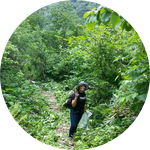About This Project
Believe it or not, the vast majority of animal species on Earth have never been named or described. This is especially true of the arthropods, little critters like insects, crustaceans, and spiders. I propose to go prospecting for new species of harvestmen, a group of arachnids that includes the familiar daddy long-legs, in the forests of the Pacific Northwest, where I have reason to believe that many species await discovery.
Ask the Scientists
Join The DiscussionWhat is the context of this research?
The diversity of tiny invertebrates - animals that lack backbones - is largely uncharted territory. When it comes to arthropods, some biologists estimate that we have only discovered 10% of all living species. Our lack of knowledge is particularly acute in groups of animals in which species closely resemble each other - making them hard for even experts to tell apart. I have used high-powered microscopy and also DNA sequencing to distinguish tricky species of tiny mite harvestmen from each other, working mostly on species from New Zealand and Australia. Next, I would like to discover, describe, and name species that are closer to my Minnesota home - mite harvestmen from the Pacific Northwest.
What is the significance of this project?
We are all concerned about the disappearance of species through extinction. But how can we protect biodiversity without a full account of the species that exist right now? This project is aimed at the fundamental work of discovering and documenting our planet's living things.
Once we have described and mapped the species ranges of the mite harvestmen of the Pacific Northwest, we can use them as a model system to understand the effects of historical climate change on the evolutionary history of animals living in these forest habitats, as I have recently done for similar animals living in the rainforests of the Australian Wet Tropics.
What are the goals of the project?
I plan to travel to Oregon in May 2017 and spent a week collecting tiny mite harvestmen from forests throughout the eastern part of the state. When I find them, I will preserve them and bring them back to my lab at Macalester College, where I will extract their DNA and sequence it. I will also image the animals' anatomy with a high-powered scanning electron microscope. By putting together information about the animals' genetic makeup and their anatomical features, I will almost certainly discover species new to science. In addition, our DNA sequence data will help us to understand how species are related to each other so that we may ultimately unravel their evolutionary history.
Budget
Recently, colleagues sent me some specimens of the tiny arachnids known as mite harvestmen collected from the forests of Oregon. Based on examination of these specimens, I have reason to suspect that some of them represent species new to science. Species of these animals are often hard to tell apart, even with high-powered microscopy, because they look so similar to each other. Luckily, DNA can help us sort them out! This funding would allow me to hunt for additional specimens of these animals and sequence their DNA, with the goal of identifying, naming, and describing new species.
Endorsed by
Meet the Team
Sarah Boyer
I am fascinated by the hidden world of tiny animals that is in fact all around us - but is only noticed when we take the time to look closely. I especially love the harvestmen, including the familiar daddy long-legs, and am interested in how geological history - for example, plate tectonic movements and climate change - has influenced the evolutionary history of these animals. I got interested in these animals when I was working on my PhD at Harvard University, and I have been hooked on them ever since. Most of my work on harvestmen has been based in New Zealand and Australia, and now I am turning my focus to harvestmen closer to home.
Project Backers
- 19Backers
- 23%Funded
- $1,295Total Donations
- $68.16Average Donation

